
Kollam, also known by its former name Quilonpronunciation (help·info), is an ancient seaport and city on the Malabar Coast of India bordering the Laccadive Sea, which is a part of the Arabian Sea. It is 71 km (44 mi) north of the state capital Thiruvananthapuram. The city is on the banks of Ashtamudi Lake and the Kallada river. It is the headquarters of the Kollam district. Kollam is the fourth largest city in Kerala and is known for cashew processing and coir manufacturing. It is the southern gateway to the Backwaters of Kerala and is a prominent tourist destination.

Ashtamudi Lake, in the Kollam District of the Indian state of Kerala, is the most visited backwater and lake in the state. It possesses a unique wetland ecosystem and a large palm-shaped water body, second only in size to the Vembanad estuary ecosystem of the state. Ashtamudi means 'eight braids' in the local Malayalam language. The name is indicative of the lake's topography with its multiple branches. The lake is also called the gateway to the backwaters of Kerala and is well known for its houseboat and backwater resorts. Ashtamudi Wetland was included in the list of wetlands of international importance, as defined by the Ramsar Convention for the conservation and sustainable utilization of wetlands.
Kollam district, is one of 14 districts of the state of Kerala, India. The district has a cross-section of Kerala's natural attributes; it is endowed with a long coastline, a major Laccadive Sea seaport and an inland lake. The district has many water bodies. Kallada River is one among them, and the east side land of river is East Kallada and the west side land is West Kallada.
Karunagappally is a municipality in the Kollam district of Kerala, India. It is 24 km north of Kollam and 60 km (37 mi) south of Alappuzha. Karunagappally taluk consists of Alappad, Ochira, Adinad, Karunagappally, Thazhava, Pavumba, Thodiyoor, Kallalibhagom, Thevalakkara, Chavara, Neendakara, Clappana, Kulasekharapuram, Thekkumbhagam, Ayanivelikulangara, Panmana, Ponmana and Vadakumthala. The taluk is bound on the north by Kayamkulam, on the east by Kunnathur taluk, on the south by Kollam and on the west by the Arabian Sea. It is one of the fastest developing towns in Kerala and is part of Kollam metropolitan area.
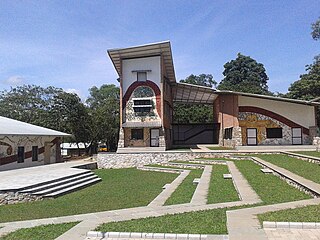
Chandanathope is a town located in Kollam district, Kerala. It lies 23 kilometres (14 mi) from Paravur town and 8 kilometres (5.0 mi) from Kollam city centre on the Kollam–Thirumangalam National Highway 744. In Malayalam, the name denotes a place with sandalwood plantations. It is also known for cashew processing and its exports two major cashew exporters of Kollam namely VLC Cashews and MARK has their facilities in the town.
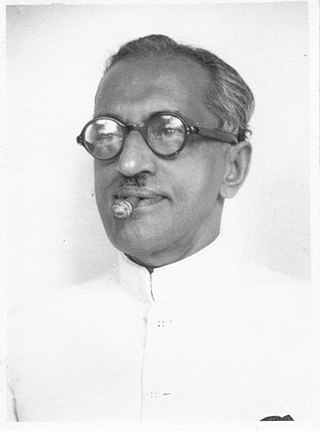
C. P. Mathen, in full Chalakuzhy Paulose Mathen, was an Indian politician who served as Member of the Indian Parliament in the first Lok Sabha, constituted in 1952 after India gained independence from Great Britain. He represented the Thiruvalla constituency of Kerala. Mathen was appointed the Indian Ambassador to Sudan after his single term in the Lok Sabha. Before his entry into politics, Mathen was a businessman with interests in cashew, minerals, insurance, plantations and banking. He was responsible for starting the Alleppey Chamber of Commerce. He was Managing Director of the Travancore National and Quilon Bank when it suffered a run of unprecedented length that forced it to close. The bank run was said to have been escalated by Sir C. P. Ramaswami Iyer, the Dewan of Travancore, in an attempt to reduce the power of the Christian Community who were agitating for fair representation in the governing council of this Princely State. C.P. Mathen was extradited from Madras and imprisoned in Trivandrum, allegedly for balance sheet irregularities. He was sentenced to rigorous imprisonment but offered many chances to walk free if he would acknowledge guilt. C.P. Mathen refused these offers, maintaining his innocence for more than three years. He became something of a folk hero for his uncompromising stand. He was released on 22 January 1942 without condition or explanation and returned to Madras.

The Kollam–Sengottai railway line is a railway line in South India which connects Kollam Junction in Kerala state and Sengottai in Tamil Nadu. The Quilon–Shencottah railway line was the first railway line in the erstwhile Travancore state and is more than a century old. The Kollam–Sengottai section is part of the Kollam–Chennai metre-gauge rail route commissioned by the British in 1904. The line has been completely converted to broad gauge and is now fully operational from Kollam Junction to Shengottai.

Kollam Port is one of the historic ports situated 4 kilometres (2.5 mi) away from Downtown Kollam ,14 km north of Paravur and 24 km north of Varkala Town It is the second largest port in Kerala by volume of cargo handled and facilities. Located on the south-west coast of India, under the name of Quilon Port it became one of the country's most important trade hubs from the ninth to the seventeenth centuries. Kollam was one of the five Indian ports visited by Ibn Battuta.

The Asramam Maidanam or Ashramam Maithanam is an urban park, or maidhanam, in the city of Kollam, in Kerala, India. At 72 acres (29 ha), it is the largest open space within Kerala Municipal Corporation limits. The maidan is considered one of the green lungs of the city and regularly hosts the city's main cultural and sports events. It holds an adventure park children's park, picnic village, British Residency and mangrove forests making it an important tourism spot in the city.
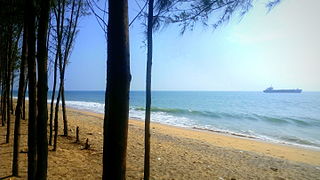
Mundakkal, also spelt Mundackal, is an important residential area and industrial hub situated in the city of Kollam, Kerala, India. The place is considered as the capital of India's cashew processing activities. Kerala State Cashew Development Corporation Limited(KSCDC) and Cashew Export Promotion Council of India(CEPCI) are headquartered at Mundakkal in Kollam city. It is an important tourist place in the city and a part of Downtown Kollam which gained in significance because of the presence of a flourishing beach. During 'Karkidaka Vavubali', thousands of devotees arrive on the beach to perform the Vavubali Tharpanam. Vavubali is an important ritual observed by Hindus in Kerala in the month of Karkidakam. The ritual involves people offering Bali to the departed souls. The ritual is performed by men, women, and children.

The Kerala State Cashew Development Corporation Limited or KSCDC is a model employer in the field of cashew industry mainly to protect the interest of workers and to provide maximum employment to its workers and to give statutory benefits like minimum wages, bonus, etc. prevailing in the cashew industry. It is headquartered in Kollam city, called "Cashew Capital of the World". The head office is situated at Cashew House, Mundakkal in Kollam City, Kerala. KSCDC was incorporated in July 1969 and started Commercial activities in the year 1971 as a company fully owned by the Government of Kerala. Corporation has now more than a turn over of Rs. 2.50 billion. A Central Export Promotion Council for Cashew, Cashew Export Promotion Council of India (CEPCI) is situated at Kollam city.

Chamakada or Chamakkada is one of the trade hubs of the city of Kollam, India. It is an important neighbourhood in the city and is located at the core Downtown Kollam area. The area is very famous for wholesale dealers and rice merchants. The local retail dealers are filling the stocks regularly from Chamakada-based wholesale dealers. So many bank branches, godowns, store rooms, printing presses, automobile spare parts stores, courier services etc. are located at Chamakada area. Chamakada is the second main commercial centre of Kollam city after Chinnakada. So many famous restaurants also located at Chamakada.
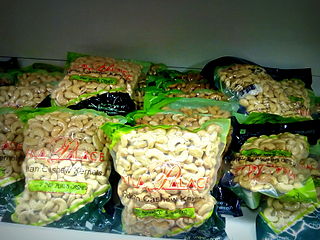
The Cashew business in Kollam is based in the eponymous city, which is known as the Cashew Capital of the World. Kollam is the largest processed cashew exporter in the world. As of 2011 there were more than 600 cashew processing units in the city. About 800,000 tonnes of raw cashews are imported to the city for processing every year. 80% of India's export quality cashew kernels were prepared in Kollam. Kollam has remained the cashew capital of the world since 1930s.
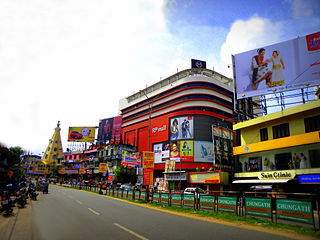
Kollam or Quilon is an old seaport and a city on the Laccadive Sea coast in Kerala, India, on Ashtamudi Lake. The city remains notable as the ancient commercial capital of Kerala and the southwestern Indian coast, in addition to its fame as the "Cashew Capital of the World". The Kollam Municipal Corporation has the second largest budget in Kerala in terms of revenue and expenditure.

Kollam Cantonment is a residential neighbourhood in the city of Kollam. It arose as a cantonment of the British Raj in the 17th century. It is now a thickly populated area of the city of Kollam. Some of the important business centres, shopping complexes and Government offices are located here. Kollam Junction railway station is also located near to cantonment area.

Transport in Kollam includes various modes of road, rail and water transportation in the city and its suburbs. State-owned Kerala State Road Transport Corporation buses, private buses, Indian Railways, state-owned Kerala State Water Transport Department boats & ferry, taxis and auto rickshaws are serving the city of Kollam. The city had a strong commercial reputation since the days of the Phoenicians and Romans. Ibn Battuta mentioned Kollam Port as one of the five Indian ports he had seen during the course of his twenty-four year travels.

Mahatma Gandhi Park is a public park situated near Kollam Beach in the city of Kollam, Kerala, India. It is about 2 km away from Chinnakada - The city centre of 'Cashew Capital of the World'. It is one of the main centres of recreational activities in Kollam city. The park is owned by Kollam Municipal Corporation and is operated by Rural Tourism Development Company (RUTODEC), a private firm, on contract for a period of five years for maintenance. 'The Quilon Beach' five star hotel(Formerly known as Beach Orchid) is located near to this park.

Quilon or Coulãopronunciation (help·info), officially Kollampronunciation (help·info) is one of the ancient civilizations in India.It is one of the oldest port cities in the Malabar Coast and was the capital city of historic Venad Kingdom and Travancore Kingdom. Quilon was once an important trading port in India. It was also known as Desinganadu. It is now known as the "Cashew Capital of the World".

Kollam Port Road or Port Road, Kollam is a four lane road in the city of Kollam, India. The 2.8-kilometre-long (1.7 mi) road connects historic Port of Quilon and Vaddy with Kochupilamoodu in the city through Kollam Beach.



















